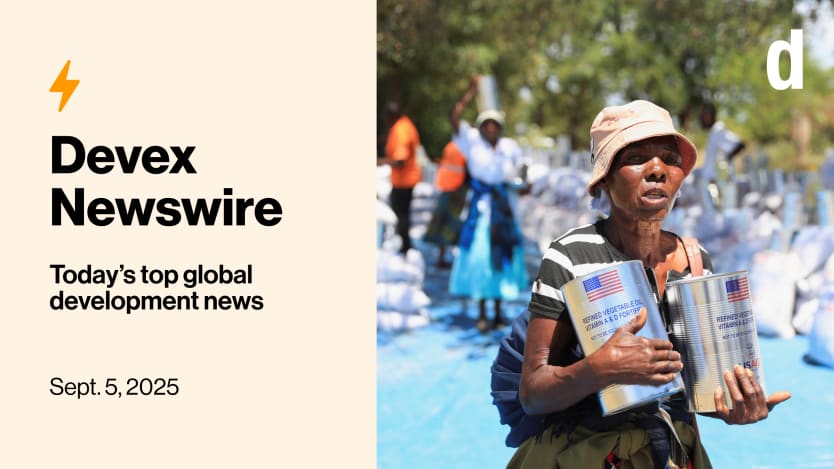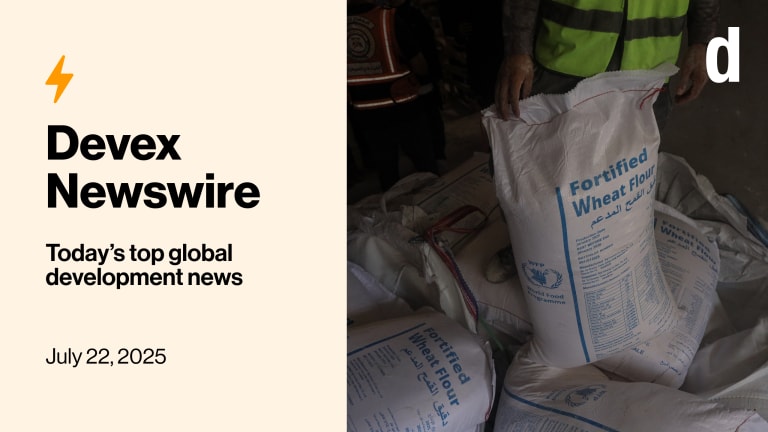Presented by Boehringer Ingelheim

As U.S. aid dried up, so did Zimbabwe’s farmland, thanks to an extreme 2024 El Niño-fueled drought, a double punch for a country where some 3.5 million children in rural areas experience crisis-level food insecurity. We offer an on-the-ground look at what the cuts mean for some of those children.
Also in today’s edition: U.S. cuts hit U.N. peacekeeping hard. We have the specifics.
+ Upcoming events next week: On Tuesday, we’ll host a Devex Pro Funding event to get an insider briefing on the Gordon and Betty Moore Foundation’s evidence-driven grantmaking. Register now. And on Thursday, we’ll be discussing what happens when funders truly listen to grantees and act on it, with insights from the Mighty Arrow Family Foundation’s funding strategy. Register here.
Food for thought
The connection between food and education is an integral one. Oftentimes, schools are the only place vulnerable children can get a meal. And hungry children struggle in the classroom, assuming they can even make it to a classroom at all.
For 12-year-old Abel Nkube, food made his education possible. Often, he and his classmates were so exhausted on their way home from school that they lay down among the thorny scrub that covers Nkayi district and slept. Having gone the whole day without anything to eat, the two-hour trek back home was too much to bear.
But since January, the boys’ plight improved after Mary’s Meals International, or MMI, began supplying food to the school. “Even if we get home and there is nothing to eat, at least we have had some food at school,” Abel told Devex contributor Gabriella Jóźwiak during her recent visit.
Zimbabwe is facing a funding loss of $83 million due to USAID cuts, representing a 35% drop in U.S. contributions. But Abel is one of the lucky ones because MMI didn’t rely on USAID funding. “We are hugely fortunate that a significant proportion of our income comes from what we refer to as our grassroots funding,” said MMI’s Alex Keay. “That’s members of the general public … who are really committed and passionate supporters of our work.”
But MMI and its partners are not out of the woods. The Organisation of Rural Associations for Progress, or ORAP, which is MMI’s delivery partner in several districts, experienced problems when the Trump administration froze foreign aid.
“There was a lot of negotiation between the lead partner and USAID,” said ORAP CEO Mvuselelo Huni. “It’s working normally now, but … we’ve not yet confirmed our budget for the coming year [from October]. We need that so we can make plans for the rest of the year.”
In the meantime, children like Abel need the food to thrive. Fanta Khumalo, a teacher at Abel’s school, has seen the difference a meal can make. “Before the children were afraid to come to school with empty tummies,” she said, looking out across the parched land between the school’s buildings. “Teachers have reported children are not complaining about hunger anymore and absenteeism has been addressed.”
Read: Water and aid dry up in Zimbabwe — who will feed the children?
A hard lesson
The problem of education and aid cuts extends far beyond Zimbabwe. It’s a growing global crisis. In fact, an additional 6 million children could lose the ability to go to school next year as a result of the cuts, according to a new UNICEF analysis. That’s equal to roughly all primary school students in Italy and Germany combined.
Global education funding is expected to plunge about $3.2 billion by 2026, a 24% reduction, based on cuts announced by donors. The U.S., Germany, and France account for nearly 80% of the expected cuts. UNICEF projects that most of the children who would lose access to education would be in the West and Central Africa and the Middle East and North Africa regions.
Primary education, school feeding programs, and girls’ education efforts are all expected to take a significant hit, as will funding for education in countries facing humanitarian crises, according to the report.
“Every dollar cut from education is not just a budgetary decision, it's a child's future hanging in the balance,” UNICEF Executive Director Catherine Russell said in a statement. “Education, especially in emergency settings, often serves as a lifeline, connecting children to essential services like health, protection and nutrition. It also provides the strongest opportunity for a child to escape poverty and build a better life.”
Out of pocket
A judge in the United States has published a judgment blocking the Trump administration’s efforts to freeze billions in foreign aid.
Last week, the White House announced plans to cancel $4.9 billion of funding which is due to expire at the end of the year, through what’s known as a “pocket rescission” — a little-used budget move of questionable legality, which would see funding frozen until Sept. 30, the end of the U.S. fiscal year, at which point it would expire.
That money is part of a bigger pot, worth roughly $11.5 billion, which is due to expire if not spent by the end of the year. U.S. District Judge Amir Ali’s ruling suggests that all of that money must be spent as Congress intends.
“There is not a plausible interpretation of the statutes that would justify the billions of dollars they plan to withhold,” Ali wrote in his judgment. “Whatever the reason, Defendants have given no justification to displace the bedrock expectation that Congress’s appropriations must be followed.”
Read more: Court watch — the latest on the USAID docket
+ Listen: For the latest episode of our podcast series, my colleagues David Ainsworth, Michael Igoe, and Ayenat Mersie discuss the Trump administration’s proposed pocket rescission and other top global development stories from this week.
Not keeping the peace
In May, United Nations Secretary-General António Guterres instructed his senior department heads to find ways to eliminate up to 20% of posts in the U.N. Secretariat.
On Wednesday, U.N. staff got the first taste of what those cuts will look like during a closed-door town hall meeting at U.N. headquarters, my colleague Colum Lynch tells me.
The U.N. chief has approved proposals from his senior advisors to eliminate 123 posts in the departments of peace operations, or DPO, and political and peacebuilding affairs, or DPPA, according to notes from the meeting.
The proposal calls for the elimination of two senior posts, including the assistant secretary-general for Europe, Central Asia, and the Americas, currently held by Miroslav Jenča of Slovakia, and the assistant secretary-general for the rule of law and security institutions, currently held by Alexandre Zouev, a Russian national.
The proposal — which would require approval by U.N. member states — calls for the elimination of some 55 posts out of a total of 291 in DPPA, although 28 of those posts are currently vacant. The ax would also fall on four director-level posts, 28 professional-level posts, and 11 administrative posts. DPO would eliminate 68 posts out of a total of 487, though 22 of those posts are also vacant.
The proposal also calls for consolidating administrative functions from the executive offices of the two departments into the Department of Support. The rule of law office, for instance, will be merged into the Peacebuilding Support Office.
The reform package will be reviewed by the U.N. budget committee on Sept. 19 before being considered by government budget experts in the U.N.’s Fifth Committee, which approves U.N. budgets.
Background: UN chief outlines plans for thousands of new job cuts
Plus: UN80 and the incredible shrinking United Nations (Pro)
+ Not yet a Devex Pro member? Start your 15-day free trial today to access all our exclusive reporting and analyses, data-driven funding insights, members-only events and briefings with sector leaders, and the Pro Insider — a weekend newsletter that gives you a weekly head start on our industry’s big moves.
Delayed goal
The Gates Foundation’s Goalkeepers report has become something of a mainstay in September, especially during the U.N. General Assembly. But those waiting for the report’s release will have to wait until December this year.
That’s because “uncertainty around current and potential aid cuts in the US and other donor countries, ongoing litigation, and pending U.S. congressional actions” make it difficult to forecast the long-term impact of global health funding decisions, according to a press release.
Specifically, there’s the Sept. 30 deadline for the U.S. budget talks, which are sure to be contentious, along with budget decisions in other donor countries. Meanwhile, at the end of November, the results of the Global Fund to Fight AIDS, Tuberculosis and Malaria’s eighth replenishment funding cycle will be revealed.
But there’s still plenty coming from the Gates Foundation between now and December. That includes laying out a vision for how the world can cut child deaths in half by 2045 and continue to reinvest in global health, including funding for Gavi, the Vaccine Alliance and the Global Fund, and for the research and development and scaling of innovations, such as advanced malaria tools, single-dose HIV treatments, and neonatal/maternal vaccines.
The foundation will also host and livestream its annual Goalkeepers event in New York City on Sept. 22, when it will:
• Announce Gates’ commitment to the Global Fund's 2026-2028 replenishment fundraising cycle.
• Feature appearances by Bill Gates, Jon Batiste, Olivia Wilde, and global and community leaders such as Dr. Opeyemi Akinalo and Dr. Senjuti Saha.
• Present the Global Goalkeeper Award and recognize this year’s Goalkeepers.
• Offer live demonstrations on the latest innovations in global health.
In other news
The Democratic Republic of Congo has declared an Ebola outbreak, with 28 suspected cases and 15 deaths. [Al Jazeera]
The U.S. announced yesterday it will provide the HIV-prevention drug lenacapavir to some 2 million people by 2028 through PEPFAR and the Global Fund. [Washington Post]
The death toll from the 6.0-magnitude earthquake that hit Afghanistan on Sunday has now climbed to at least 2,200, as another tremor shook the country last night. [AP]
Sign up to Newswire for an inside look at the biggest stories in global development.








